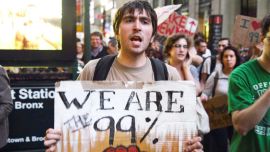Argentina is not the only country whose inhabitants are currently facing a choice between what a growing number of people regard as a thoroughly unsatisfactory present and alternatives which could prove far worse. Many others are in a similar situation. North Americans who are fed up with Donald Trump’s antics are being invited to put their faith in a variety of leftist proposals that, if put into practice, would be most unlikely to bring about the desired results. On the contrary, even watered-down versions of the “green new deal” some are keen on could have extremely unpleasant consequences for much of the population.
The British are desperately seeking a way out of the Brexit maze into which they happily wandered almost three years ago. On the other side of the English Channel, the French, Germans, Italians, Spaniards and the rest of them are struggling with problems involving the economy, defence, immigration and free speech that are every bit as complicated as the ones the hapless Theresa May plus her associates and rivals are struggling with, problems which – unless acceptable solutions are found – could have far greater repercussions for the continentals than the eventual departure of the United Kingdom from the European Union.
Elsewhere, the outlook is even hairier, what with vicious wars breaking out all over the place and terrorist groups, most of them inspired by some variety of Islam, driving intelligence services up the wall by continually mutating.
It is therefore not surprising that few governments spend much time worrying about phenomena which clearly pose far greater dangers than Trump, Brexit or the Islamic State. These include the rapid approach of artificial intelligence which, we are warned, will soon get down to depriving millions of honest folk of their jobs by tearing large hunks out of the labour market and climate change, which – according to those who think Mother Nature is punishing us for mistreating her – can only be slowed down if we eliminate much of industry and dairy farming. And then there is the recently detected presence of previously unknown bacteria and fungi that are already more than capable of repelling everything that is thrown at them.
All these threats to our well-being have acquired lobbyists who say that unless something is done to make them go away, mankind could end up like the dinosaurs. The most successful have been the “climate scientists” who, as well as pressuring governments to give them money, have taken to mobilising schoolkids worried by the thought that the planet could die before they have had a chance to enjoy what it has to offer. Per capita, the carbon footprints of the foes of climate change, who like staging conferences in places favoured by wealthy tourists, are far bigger than the ones left by most people, but that anomaly does not strike them as being worth discussing.
To get a bigger share of the available money, those who fear machines could quickly become smart enough to put their own interests first and start treating mere humans like livestock or a source of raw materials, insist that as things stand they are even more dangerous than greenhouse gases. Throughout the world computer scientists are looking for ways to make clever robots show their creators proper respect by programming them to be kind to human beings, but there are also some whose intentions are anything but benign; they want to use devices equipped with artificial intelligence on the battlefield. Needless to say, the wellfounded suspicion that this is what the Chinese are up to forces others, led by the North Americans, to do the same.
Not to be outdone when it comes to keeping people on their toes, the World Health Organisation and government departments the world over periodically warn us that new and particularly nasty bugs are on the way, so to avoid them we had better be extra careful with our travel arrangements. They are often criticised for crying wolf, but, given the speed with which an epidemic could spread, that is a risk they simply have to take.
Doomsday scenarios are now two a penny. Has it always been like this? By and large, the answer is yes. There has never been a shortage of reasons to fear that life as we know it could be about to come to an unpleasant end. It seems that every generation has been haunted by grim, and frequently realistic, thoughts about what could happen to it in the near future.
For millennia, most had something to do with religion as the Judeo-Christian God – like his counterparts in neighbouring lands – was of a notoriously vengeful disposition, but of late they have been backed by Science which, for many, has inherited the role in earthly affairs that used to be played by the deity. According to the Doomsday Clock that was built in Chicago by devotees of Science to tell us how much time we had left before a “man-made catastrophe” put an end to it all, we are now about two minutes from midnight; luckily for everyone, a galactic minute lasts a lot longer than does one on our little planet.
Some recently predicted disasters which frightened large numbers of people, such as a nuclear winter with the oceans freezing over and survivors cowering in hastily improvised shelters, or a worldwide population explosion followed by mass starvation, have yet to materialise, but plenty of others really did, among them a couple of world wars, so perhaps it would be unwise to let oneself become too sceptical.
There can be little doubt that the mood engendered by what
incurable optimists would dismiss as scaremongering influences
the way people behave, if only by making them less willing to trust
the local government or the political class as a whole. The feeling
that those who have long been in power are unable to do much
more than wring their hands and speak hopefully of getting “the
international community” to agree on courses of action that, with
luck, might have the desired effects, has eroded their authority to
such an extent that in many countries people are turning to individuals such as Trump, whose success depends directly on the
perceived failure to deliver of the established “elites.”
related news



















Comments